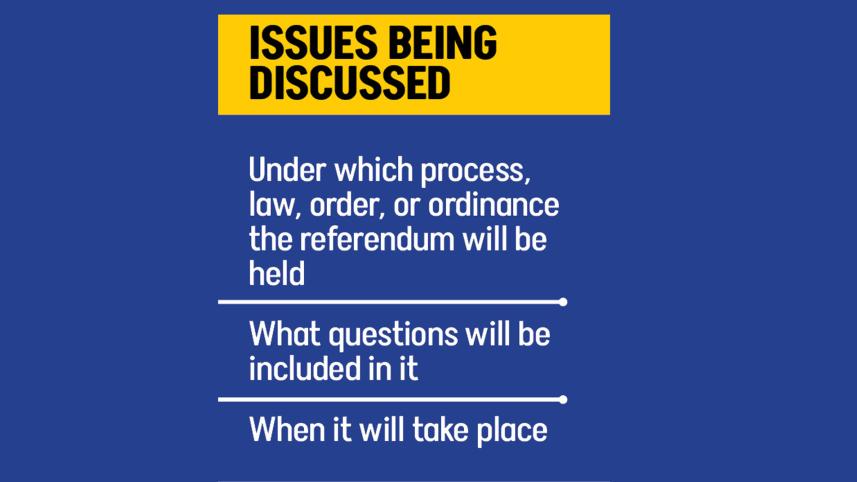July Charter: Next parliament may get 90-120 days for implementation

The National Consensus Commission is considering a proposal to allow the next parliament to function as a Constitution Reform Assembly for three to four months to implement the July Charter.
At an unofficial meeting yesterday, the commission discussed possible recommendations for the interim government on implementing the charter, including holding a referendum.
It also considered recommending a "July Sanad Bastobayon Bishesh Adesh" (Special July Charter Implementation Order) to be issued by the president and that the referendum will be held under that order.
However, the commission will not propose any specific date for the referendum.
It has not yet finalised the exact wording of the question to be asked in the referendum, said Prof Ali Riaz, vice-president of the consensus commission.
Commisison members said it may suggest asking the public "whether they support the consensus reached through the commission's dialogue with political parties".
A member said the body is likely to recommend that after the election, MPs of the next parliament perform dual roles -- carry out legislative duties and undertake constitutional reform within a specific time.
"They will be given 90 to 120 days to complete the reforms outlined in the July Charter, after which they will resume their standard legislative responsibilities," the member said.
The commission was supposed to submit its recommendations on the charter's implementation along with the final version of the document to the government yesterday, but it could not.
Ali Riaz said, "Chief Adviser Prof Muhammad Yunus, head of the consensus commission, is now out of the country. To whom will we submit it now?"
He also told The Daily Star that the commission is holding informal discussions with political parties on three outstanding issues -- under which process, law, order, or ordinance the referendum will be held; what questions will be included in it; and when the referendum will take place.
"All political parties have agreed to hold a referendum," Riaz said. "Now the commission is trying to bring them to a common ground on the remaining three issues, and that is why we are holding informal talks with them. We have made progress on those issues as well."
Although Riaz claimed progress made, a commission member said leaders of the BNP and Jamaat-e-Islami in separate unofficial meetings with Riaz yesterday stood firmly on when the referendum should be held.
The BNP insists the referendum be held on the same day as the national election, while Jamaat demands it be held before the polls.
During the meeting, BNP Standing Committee member Salahuddin Ahmed discussed the pros and cons of both options and reiterated his party's firm position.
A source present quoted Salahuddin as saying a pre-election referendum would be costly, could see low turnout, and might delay the polls due to uncertainty over results.
"If the referendum is held along with the polls, it will save costs, ensure better turnout, and eliminate fears of delaying the elections," he told the commission.
A three-member Jamaat delegation of Nayeb-e-Ameer Syed Abdullah Muhammad Taher, Assistant Secretary General Hamidur Rahman Azad and party leader Shishir Monir also met the commission.
They reiterated the party would not change its position on when the referendum should be held.
"We have announced programmes demanding that the referendum be held before the election," Azad told reporters.
The commission was formed in mid-February to review and integrate recommendations from six major reform commissions on the constitution, judiciary, electoral system, Anti-Corruption Commission, and public administration.
After two rounds of talks, parties reached consensus on at least 84 reform proposals and prepared the July National Charter. Half of the proposals involve constitutional reforms.
In the third round, political parties struggled to agree on how to implement the constitutional reform proposals.
On October 8, the final day of talks, it was agreed that a referendum would be held on the July Charter, but its timing and other issues remained outstanding. The commission then said it would submit recommendations to the government for its implementation.



 For all latest news, follow The Daily Star's Google News channel.
For all latest news, follow The Daily Star's Google News channel.
Comments